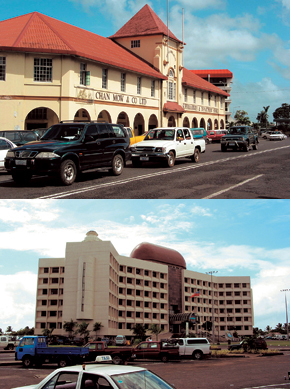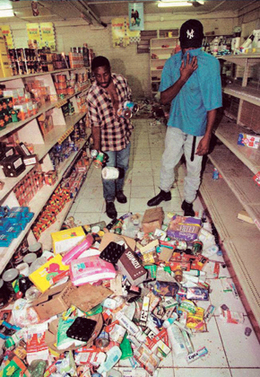 |
|
A shopping mall in downtown Apia, Samoa (above), owned by a Chinese immigrant, and a Samoan government office (below), funded by the Chinese government.
|
Papua New Guinea's dangers do not daunt China's entrepreneurs
By Bertil Lintner, independent journalist There is nothing wrong or unusual about the food at Ang's Chinese restaurant. In fact, the roast duck served there is excellent, and the Lonely Planet's guidebook assures you that its hot-and-sour soup is special. It's just the way the place looks. The yard is surrounded by high walls with razor wire and surveillance cameras. Two security guards watch the entrance and open the sliding gate only if customers, in their vehicle, appear to be genuinely wanting to have just a meal. Having satisfied the guards and parked the car inside the gate, lunch or dinner guests are met by another steel door guarded by more watchmen. They will not only shut the door but lock it once the guests are in the actual restaurant building. They guests may enjoy Ang's oriental fare in peace. Welcome to Port Moresby, the capital of Papua New Guinea-and, according to the Economist Intelligence Unit, the worst place to live among 130 world capitals and major cities. The hotel where I stayed had three armed guards outside the front gate, plus two huge German shepherd dogs. And then, needless to say, a high wall topped with razor wire, surveillance cameras and powerful spotlights at night. I was advised not to venture out on foot even in broad daylight, and this was one of the poshest areas in downtown Port Moresby. Papua New Guinea's notorious raskols-pidgin English for rascals-are everywhere. They are gangs of young men for whom crime has become a way of life. Having moved into Port Moresby from the highlands or elsewhere, they end up in shantytowns and suburbs where unemployment rates hover between 70 and 90 percent. And they were born into a culture where tribal warfare, vendettas and violence are deeply ingrained. Add the availability of firearms in urban areas, and it's not surprising that most of Port Moresby's homes resemble top security prisons.It is also not hard to understand why many expatriates have left or are leaving. At independence from Australia in 1975, there were 50,000 non-citizens in the country. Now only a few thousand Australians, Britons and Germans remain. But, as the chatter in Ang's restaurant indicates, newly-arrived mainland Chinese are replacing them as businessmen, contractors and importers-exporters. An article in a local newspaper said that "Australia has always considered Papua New Guinea its backyard [but]…since 2000, Papua New Guinea has increased its bilateral relations with China in areas of trade, investment and the military." The article asserts that "China is here to stay." Many are here to stay permanently, as well. According to official estimates, there are about 10,000 Chinese citizens in the country. Many of them are here illegally, but Papua New Guinean passports, and therefore citizenship, are not difficult to obtain. Corruption is endemic at all levels in the government and local administration. In addition, aid from China comes in handy when countries such as Australia threaten to cut their assistance because of corruption, nepotism and abuse of power in Papua New Guinea. "China's rising status as an economic and military power is becoming an important pillar for developing countries like Papua New Guinea," Tarcy Eri, a high-ranking foreign ministry official, said at China's national day celebrations on October 1 last year. China's voice at the United Nations, he said, was "one for the developing world." Besides the Russian Far East, and parts of Southeast Asia, such as upper Burma and northwestern Laos, the South Pacific - Papua New Guinea in particular - is becoming one of three areas on the world where Chinese influence is spreading so rapidly that it may soon make not only an economic but also a demographic difference. The South Pacific is especially important for a number of reasons. One is that Taiwan has been trying hard to obtain diplomatic recognition from the impoverished island nations of the Pacific, amid Beijing's drive to deny Taiwan its claims to legitimacy. Taiwan's efforts always come with generous offers of aid, something that these resource-starved countries badly need. As a result, the Marshall Islands, the Solomon Islands, Tuvalu, Kiribati, Nauru and Palau recognise "The Republic of China" - Taiwan's official name - rather than Beijing.
 |
|
Many Chinese immigrants' shops were looted during riots erupting in Port Moresby, Papua New Guinea during March 1997. Here, two employees at a Chinese run shop begin to reorganize the merchandise.
|






